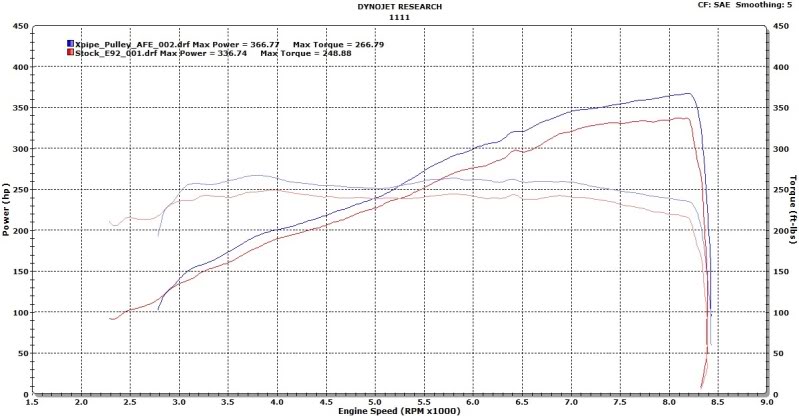Quote:
Originally Posted by swamp2

More torque is fine, nothing wrong with it, however, it does next to nothing for actually making a car faster.
...
I don't give a single rats ass about how much more - torque the car will make, neither should any true M enthusiast.
|
Quote:
Originally Posted by BMRLVR

Torque really is not what determines how fast a car will accelerate!!
|
I disagree with Swamp and others here that torque doesn't matter. If M3/M4 owners care about acceleration, they should be very happy the new car is getting 100+ lbs lbs more torque.
At the risk of exacerbating the whole 1M vs M3 debate, I'm going to use real-world numbers to illustrate, 1M vs M3 convertible, both 6MT at 95 MPH in 4th, the best starting gear for either MT car at that speed. I'm going to walk through this so you guys can calculate this yourselves to better understand it.
You want to estimate the car's
thrust first, which is essentially how much torque it puts to the ground including gearing, etc. The equation:
Wheel torque (ft lbs) x final drive ratio x 4th gear ratio / tire radius (in feet, ie 25.5 / 12 / 2)
Let's say the M3 makes 255 ft lbs at the wheels on a dynojet. We'd do 255 x 3.85 x 1.19 / 1.06 = 1102 lbs of thrust. Pretend this is moving a 4200 lb car (with driver, and yes convertibles are heavy), so 1102/ 4200 = .26, or basically .26 Gs ignoring aero, wheel-spin and rotational inertia.
Take the 1M in the same gear: 350 x 3.15 x 1.18 / 1.06 = 1227 lbs of thrust, 3700 lb car = .33 Gs. So 27% better acceleration for our example 1M.
The next step, however, is to calculate acceleration at a specific speed. Speed in MPH is: RPM x tire radius x pi x 2 x 60 / final drive ratio / 4th gear ratio / 5280 feet
So 5800 rpm in the M3 is 5800 x 1.06 x 3.1415 x 2 x 60 / 3.85 / 1.19 / 5280, or 96 mph. Take thrust using torque from the dyno curve at that specific RPM, and you get thrust to weight at that speed- I already used the ~255 ft lbs the M3 makes at 5800.
Same thing for the 1M: 4700 x 1.06 x 3.1415 x 2 x 60 / 3.15/ 1.18 / 5280 = 96 mph. And again, the 1M makes about 350 at the wheels at that rpm depending on the dyno.
So you now know how to calculate thrust to weight ratio for a particular speed. All you need are the gear ratios, weights, plus the dynos, such as:

And

And you can calculate which car will accelerate harder in any gear at any speed (again, ignoring aero, rotational inertia, etc).
Now to one of the reasons I chose these particular cars and dynos for comparison. Using the dynos shown above plus the weights, the 1M and M3 have near identical
power to weight ratios. So 4200 lbs / 375 whp = 11.2:1, plays 3700 lbs/ 330 whp, also 11.2:1.
Now if torque really doesn't matter the numbers say the cars should accelerate be very close to identically. As we calculated above, however, this is not the case at most speeds. In fact, using these weights and dynos (and identical power to weights), the 1M in this example would pull an average of about ~10% harder if both cars were shifted perfectly. That looks like the graph below- the 1M is pulling harder from any starting speed until 125 mph, at which point they are equal:

Now this is not supposed to be a 1M vs M3 argument. This is to illustrate that power to weight is
not the only thing that matters.
Area under the power curve is what matters, and all else being equal, more torque gives you that. You're welcome to do the actual math with any numbers you like, but any time you put power to weight equal and raise the torque the results are likely to be similar.
Bottom line for me: The extra 100 ft/lbs from the M4 will probably give it the equivalent of ~10% more hp in the from of more area under the horsepower curve, which will have a bigger effect on real-world acceleration than the roughly 8% less weight it will be carrying around. So from that point of view, even at a rated 415 hp, the M4 is shaping up rather well.
Now I'm as big a fan of normally aspirated motors as the next guy, but I clearly understand there will be gains other than fuel economy from forced induction. And I certainly understand that torque can be fun too.